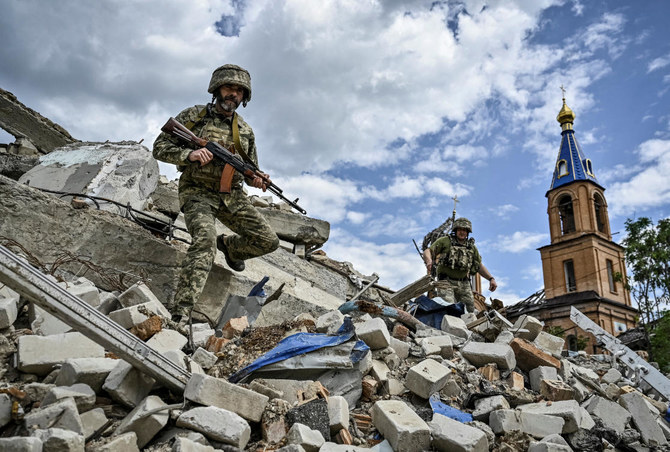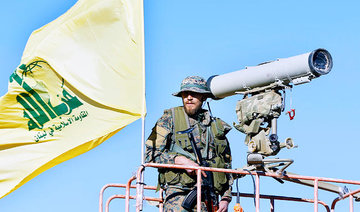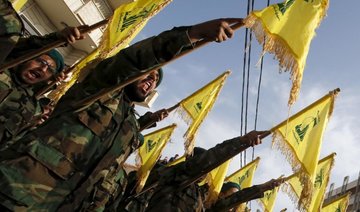LONDON: The British government is under renewed pressure to outlaw Hezbollah in the UK by making no distinction between its military and political wings.
In the House of Commons, Labour chair of the friends of Israel Joan Ryan moved a motion on Thursday that called for Hezbollah to be designated a terrorist organisation and for Britain to impose a complete ban to bring it into line with Canada, the US, the Arab League and the Netherlands.
Currently, Hezbollah’s military wing in is proscribed but not its political organisation which is based in Lebanon and supported by Iran.
“There is no distinction and we need to be clear about that,” Ryan said in the UK parliament.
She listed the string of deadly attacks carried out by Hezbollah in recent decades and said the organization, “Has wreaked death and destruction throughout the Middle East” while helping to drive Iran’s expansionism in the region.
Hezbollah’s mounting military capability poses a growing threat to the Middle East she continued. “It has trebled the size of its fighting force from 17,000 to 45,000 men…it now has an estimated 120,000 to 140,000 rockets and missiles – an arsenal larger than that of many states.”
Ryan also accused the group of “aiding and abetting the Assad regime’s butchery in Syria”.
UK government policy currently opposes changing the designation for fear of further destabilizing Lebanon.
Speaking in favour of full proscription, Conservative MP David Jones said that "Hezbollah is the most destabilising influence in Lebanon," and described the group as "a dangerous, aggressive terrorist organisation."
Ian Austin was one of several Labour MPs to defy a party briefing note circulated prior to the debate advising MPs to vote against a full ban and stating that: “Full proscription could be a move against dialogue and meaningful peace negotiations in the Middle East.”
“The idea Hezbollah is a partner for peace is misguided,” Austin said.
Speaking in support of the motion, Conservative MP Theresa Villiers said Hizbollah had been responsible for numerous terrorist attacks around the world, with the “most notorious” at a Jewish centre in Buenos Aries, Argentina where a bomb killed 85 and injured hundreds in 1994. An Argentinian inquiry pointed the finger at Hezbollah and Iran.
Villiers added that Hezbollah been a “deeply malevolence presence in the Syrian civil war”.
The Ryan motion has not received support from the UK government or the Labour shadow cabinet and is unlikely to gain traction.
But Ryan said: “Hezbollah is a terrorist organisation, driven by an anti-semitic ideology which seeks the destruction of Israel. It has wreaked death and destruction throughout the Middle East. It makes no distinction between its political and military wings, and neither should the British government. “
David Ibsen, the executive director of the Counter Extremism Project, said that Hezbollah itself does not recognise a distinction between these entities and emphasised the need for “a new realism in the UK about the nature of Hezbollah.”
“There is no ‘military’ and ‘political’ wings of Hezbollah, it is one pernicious terrorist organisation founded and bankrolled by Iran. Hezbollah’s top officials brazenly acknowledge this fact.”
Arab governments have expressed mounting concern over Iran’s growing sphere of influence in the Middle East and its use of Hezbollah to engineer an expanded role in regional conflicts.
A statement released by the Arab League last November accused Tehran and its proxy of destabilising the region.
Ibsen said: “Thousands of Hezbollah fighters made the crucial difference in Syria for Bashar al-Assad and have trained Houthi rebels in Yemen on behalf of their Iranian benefactors.”
A spokesperson for Syria Solidarity UK outlined the “extensive crimes against Syrian civilians” carried out by Hezbollah, which “took part in the mass displacement of hundreds of thousands” of people in Aleppo and other areas.
“The failure of British MPs to come together to protect civilians in Syria has allowed Hezbollah to expand, has increased the threat of terrorism, and has worsened the refugee crisis,” the spokesperson said.
Pressure to extend the ban has intensified in recent weeks following a US crackdown on Hezbollah’s international financing networks with the launch of a new ‘narco-terrorism’ task force to investigate the group’s cross-border drug trafficking and money laundering activities.
During a speech on January 12 in which he described the Iranian regime as “the world’s leading state sponsor of terror,” President Trump called on all US allies to re-classify Hezbollah in its entirety as a terrorist organisation and take stronger steps to “confront Iran’s other malign activities.”
Visiting Lebanon on Tuesday, the U.S. Treasury’s Assistant Secretary for Terrorist Financing Marshall Billingslea “urged Lebanon to take every possible measure to ensure (Hezbollah) is not part of the financial sector,” according to a statement by the US embassy in Beirut.
Hezbollah is one of 60 groups listed as foreign terrorist organisations by the US State Department.
In addition to bringing the UK’s position into closer alignment with Trump’s hardline stance on Iran, a move to extend the ban would also answer voices from the Israel lobby, which has repeatedly called for a crackdown on the group.
Michael McCann, director at the Israel Britain Alliance, described the UK’s designation of Hezbollah as “wrong headed” and said it “bears responsibility for the murder of innocents across the globe.”
“Hezbollah’s operations breach the 2000 UK Terrorism Act and the group must be banned, it’s that simple,” he said.
British government under pressure to impose total ban on Hezbollah
British government under pressure to impose total ban on Hezbollah

5 treated after stabbing in south London, 1 man arrested
Authorities didn’t provide a motive for the stabbing
LONDON: Five people have been treated following a stabbing Thursday morning in south London, according to London’s Ambulance Service.
London’s Metropolitan Police said that a man was arrested following the stabbing in Croydon, which British media reports said happened near an Asda supermarket. Authorities didn’t provide a motive for the stabbing.
The ambulance service said that one person was taken to a major trauma center in London and four other people were hospitalized.
“We sent a number of resources to the scene, including ambulance crews, a paramedic in a fast response car, an incident response officer, members of our Tactical Response Unit and London’s Air Ambulance,” the service said.
The violence came on the same day that a teenager faced sentencing for fatally stabbing three girls at a Taylor Swift-themed summer dance class in the northwestern English town of Southport.
Police in Hungary investigate bomb threats affecting over 240 schools

- The threats, which came in the form of emails, were identical in their text
- Officers were being dispatched to all affected institutions
BUDAPEST: Police in Hungary said Thursday they were investigating bomb threats that were sent to more than 240 schools across the country, resulting in classes being canceled at some schools.
The threats, which came in the form of emails, were identical in their text and likely sent by a single sender, police said in a statement. Officers were being dispatched to all affected institutions. No explosives or explosive devices were found in the buildings inspected so far, police added.
Gergely Gulyás, chief of staff to Prime Minister Viktor Orbán, said that “education in most schools in the country proceeds smoothly,” and that school administrators could decide for themselves whether to send students home.
He said Orbán on Thursday had consulted repeatedly with the interior minister and the minister in charge of Hungary’s secret services.
The emails were sent from numerous email providers “including foreign ones,” Gulyás said. Hungarian secret services were in consultation with their counterparts in neighboring Slovakia, where similar bomb threats were made last year, Gulyás said.
On Wednesday, numerous schools in around a dozen cities in Bulgaria also received bomb threats, according to Bulgarian public broadcaster BNT.
Kyiv claims Russian forces killed six captured Ukrainian troops

- Officials both in Moscow and Kyiv have accused the other’s army of carrying out killings
- “In the video, the occupiers recorded their own crime,” Ukrainian human rights ombudsman Dmytro Lubinets wrote in a social media post
KYIV: Kyiv accused Russian forces on Thursday of killing six captured Ukrainian servicemen and said it was notifying international rights groups of the latest alleged Russian war crime.
Officials both in Moscow and Kyiv have accused the other’s army of carrying out killings of captured soldiers in violation of international law.
The Ukrainian human rights ombudsman Dmytro Lubinets made the allegations referring to footage circulating on social media that appears to show Russian troops shooting unarmed Ukrainian troops to death.
“In the video, the occupiers recorded their own crime — shooting six Ukrainian soldiers who were captured in the back,” he wrote in a social media post.
The video, which has spread across social media, could not be verified by AFP and there was no immediate comment from Moscow on the claims.
It appears to show Russian soldiers in a muddied frontline area ordering the Ukrainian troops to a clearing where they are then shot in the back one by one.
“I am once again sending information about this crime to the UN and the ICRC (International Committee of the Red Cross). These facts must be recorded,” Lubinets added.
Saudi Arabia’s transformation attracting rising number of students in India

- India’s Education Ministry sponsored a university program on the Kingdom’s development programs
- Sessions in New Delhi also garnered interest from students in other parts of India, coordinator says
NEW DELHI: Saudi Arabia’s transformation programs and Vision 2030 are gaining interest among university students in India, as one of the country’s most prestigious educational institutions hosts a special course on the topic this week.
The five-day course — organized by Jawaharlal Nehru University in New Delhi in cooperation with the Ministry of Education — is part of the Indian government’s Global Initiative of Academic Networks program aimed at encouraging exchanges with the world’s top faculty members and scientists.
The special course that will conclude on Friday has been led by Prof. Joseph Albert Kechichian, senior fellow at the King Faisal Center for Research and Islamic Studies in Riyadh, who specializes in West Asian politics and foreign policy, especially of the Gulf region.
The sessions have attracted students from different parts of India, said Prof. Sameena Hameed from the JNU’s Centre for West Asian Studies, who coordinates the course.
“It’s a very niche course focused on one country and a specific region but to our surprise it has gained traction,” Hameed told Arab News, adding that the number of registered participants was double the initial expectation of 50 students.
“I’m still receiving the request from students … down south in Kerala and other states as well, so it means these kind of subjects are gaining traction because it moves in tandem with India’s increasing bilateral interest and relations in the region.”
The rising interest among Indian students was also evident for Kechichian, who was visiting India for a third time after previous speaking engagements at JNU in 2006 and 2016.
“In 2025, I’m beginning to notice sharp improvements, sharp interests in terms of young scholars who are looking at Saudi Arabia in very different eyes; no longer looking at it only as the mere oil producer, but also as a dynamic society with which Indian communities must come to terms (with), and that’s a positive development,” Kechichian told Arab News on the sidelines of the sessions on Tuesday.
The course, which was also livestreamed to registered participants, aims to provide people with “a comprehensive understanding of the changes that are taking place in the Kingdom,” he added.
“Saudi Arabia is is a young country; the majority of the population is relatively young and they are in the process of acquiring new skills, opening new opportunities in terms of entrepreneurship and others, and, obviously, all of these young people need to have contacts with the rest of the world, among whom India, of course, plays an important role as well.”
Saudi-Indian ties have steadily gained prominence over the past three decades, and reached a new level of engagement in 2019, following Crown Prince Mohammed bin Salman’s visit to New Delhi and the establishment of the Strategic Partnership Council.
These aspects set the stage for further collaboration, which gained momentum when Saudi Arabia presided over the Group of 20 largest economies in 2020, followed by India’s presidency of the bloc in 2023.
The evolving relationship has not only deepened strategic ties, but also fostered cooperation in trade, security, new technologies and regional stability.
Amid “tremendous interest” to improve ties between Saudi and Indian business communities, Kechichian said that such courses will help both sides to get to know each other better and pave the way for future cooperation.
“All indications are, in fact, that both sides are trying to encourage business leaders to create entrepreneurship and to do as much as possible to benefit both sides,” he said.
For Aarya R. Sardesai, a political science student at the Janki Devi Memorial College in the University of Delhi, understanding Saudi Arabia better was integral to her education.
“Obviously, it will benefit me to know in terms of how my country and Saudi Arabia can have better relations and stronger ties in future,” Sardesai told Arab News.
“I think Saudi Arabia is trying to set a new trend; it is trying to incline itself with the fast-paced globalized world and the attempts that they are making to bring these shifts … are quite commendable.”
The changes happening in Saudi Arabia were a point of attraction for many of the participants.
“This is more about the future parts of Gulf countries and how they are going to go about diversifying their economies … it is very close to my research,” said Ph.D. student Deepika Matangi.
Kelvin Benny, a Ph.D. candidate at JNU, said that he took part in the course because of Saudi Arabia’s importance in India’s Act West Policy, a government strategy aimed at strengthening relations with Arab countries.
“So, for our academic input we need deep research on Saudi, and especially Saudi is a country undergoing a huge transformation from a typical oil-based economy to a modern economy,” Benny told Arab News. “So, in this context, Saudi is very essential.”
UK delaying reversal on Israeli arms export ban: Report

- British PM expects ‘sustained’ aid deliveries to Gaza before reversing partial weapons freeze
- Israeli counterpart raised the matter during phone call on Tuesday
LONDON: The UK is delaying lifting its partial ban on arms exports to Israel until “sustained” humanitarian aid shipments arrive in Gaza, The Times reported.
Prime Minister Keir Starmer, who spoke to his Israeli counterpart Benjamin Netanyahu by telephone on Tuesday, is believed to be resisting pressure from Tel Aviv on the matter.
Starmer is expected to wait for formal legal advice that Israel’s policy on aid deliveries has improved before reversing the ban.
A source told The Times: “There are signs that the trucks are getting through. But we have told the Israelis we need that to be sustained and to see numbers increased.”
Last September, UK Foreign Secretary David Lammy suspended 30 of 350 export licenses to Israel due to fears that the weapons could be used to commit violations of international law, implicating Britain in the process. Licenses are reviewed every six weeks as per government policy.
The government’s existing legal position on the banned export licenses cites credible claims of Israeli mistreatment of Palestinian prisoners of war, as well as insufficient aid deliveries to Gaza. Israel could “reasonably do more to facilitate humanitarian access and distribution,” it says.
During Tuesday’s phone call, Netanyahu “raised the issue of the weapons export licenses to Israel that have been frozen in the UK,” according to an Israeli government report.
There are concerns that an Israeli law set to take effect next week designating the UN Relief and Works Agency for Palestine Refugees as a terrorist group could prevent it from helping with urgent aid deliveries.
UNRWA is the largest aid organization in Gaza, with about 13,000 staff in the Palestinian enclave.
















